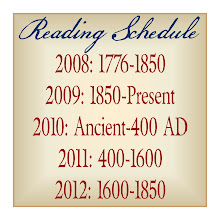Since this is such a classic story, I, as I'm sure you did, knew that Jekyll and Hyde were the same person, but it was interesting to read how it came about and how it was discovered by others. And I loved reading it the way it was written. There is something about the formal, classic, way that Stephenson writes that trumps all the versions of the story that I have heard and seen.
I also read Frankenstein with my kids this month (well the Children's Illustrated Classic version, anyway,) and in reading two "classic horror stories" I came to the conclusion that I didn't find them "horrific" as much as sad.
In the case of Jekyll and Hyde, I found it sad that selfishness can get people into so much trouble. Sad that the story had to end the way it did. Sad that man can be so prideful, that they have no one to turn to when they desperately need help. Sad that the one and only person Jekyll did confide in, didn't help, but instead chose to be appalled and reject him. Sad that people can fall so far through temptations.
When I first read Jekyll's letter to the Utterson, I couldn't believe the way that he described why he chose to continue to become Hyde. Such selfishness upset me. But after thinking about it for a little while, I realized how tempting that could be. I think, to a point, we do have two people inside of us. Who of us hasn't, at one time or another, felt a little rebellious, or angry, towards someone else? Most of us don't act on those urges because of the consequences that follow. But if you did have a disquise that would be impossible to track down, I think a lot of people would take advantage of the opportunity to release some anger, resentment, or revenge. How dangerous life would be if that was the case.
I liked the nature of the book, and the lessons I could take away from it. But in the end, I was especially glad it was fiction.
So what did you think?
(Poll for December's book is in the side bar. I decided to go with less "classic" and more "present" since this will be one of the last polls for the 1600-present time frame.)





4 comments:
I agree with your overall impression of sorrow, rather than horror.
On one level, Jekyll/Hyde represent every man, the dual natures than contend within each of us. It seems to me that the horror and repulsion that Mr. Utterson, Mr. Enfield, etc. feel upon seeing Mr. Hyde, are the very feelings we have for ourselves upon the realization that we are so very ______________. (Fill in the blank with proud, selfish, lazy, whatever.) We have an amazing capacity for seeing others faults but somehow manage to rationalize our own away...until that strange, spiritual moment when we see ourselves more clearly.
But more than anything, as I read, knowing that Jekyll and Hyde were the same person, I found this a story of addiction. I wonder how many addicts have read this and wept to see themselves so clearly portrayed. Which of them couldn't identify with Dr. J's assertion, "I could be rid of Hyde any moment I choose." Or see how he pushed his nearest friends to a distance so that really, his addiction, was his dearest friend. And how empty that left him.
Shimmy Mom,
As much as I appreciate your efforts in selecting choices for each month's reading, I'm afraid you are selecting readings for only one person other than yourself...me. I'm happy to continue with the current arrangement, but please know that if you feel your time would be better spent elsewhere, perhaps it is reasonable for this Book Club to silently pass away.
For what it's worth, I'm currently reading Man's Search for Meaning.
I probably won't read Leaves of Grass, though. It just doesn't particularly interest me.
Hey! I just found your blog because I was trying to register the same name, ha. I'm doing the same thing! I started at Gilgamesh a couple years ago and am now in the 1700s. Did your book club break down?
(Don't worry, I don't want your blog. I just went to Wordpress instead.)
And to pretend to keep this on topic: I loved Jekyll & Hyde. Such a tight, well-constructed novella. A Picture of Dorian Gray by Oscar Wilde makes a great companion read; they're about essentially the same thing.
Anyway: cool to see that I'm not the first person who's had this idea. :)
Post a Comment